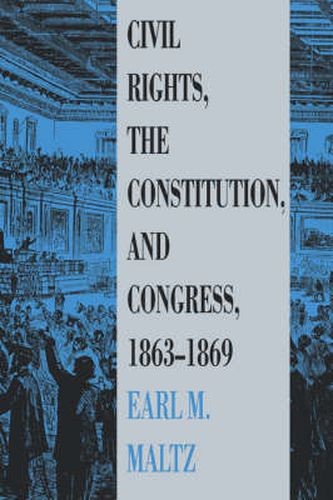Civil Rights, the Constitution and Congress, 1863-69
Earl M. Maltz

Civil Rights, the Constitution and Congress, 1863-69
Earl M. Maltz
This title is printed to order. This book may have been self-published. If so, we cannot guarantee the quality of the content. In the main most books will have gone through the editing process however some may not. We therefore suggest that you be aware of this before ordering this book. If in doubt check either the author or publisher’s details as we are unable to accept any returns unless they are faulty. Please contact us if you have any questions.
The thirteenth, fourteenth, and fifteenth amendments are the cornerstone of much of American constitutional law. They provide the foundation for the Supreme Court’s decisions on issues such as abortion and affirmative action, as well as the authority for a wide variety of important civil rights legislation. It is thus not surprising that the original understanding of those who drafted the amendments remains a hotly debated topic among historians, lawyers, political scientists, politicians, and anyone interested in civil liberties. The so-called Reconstruction Amendments are perhaps the most highly politicized issue in U.S. constitutional history. The textbook understanding of the three amendments is that, collectively, they abolish slavery and guarantee civil rights and the suffrage to U.S. citizens, including former slaves (from The New Columbia Encyclopedia, 1975). Much of the debate among scholars centers on the nature of the guarantees and the scope of the civil rights and liberties encompassed by the amendments (particularly Section I of the fourteenth).
In this provocative book Earl Maltz provides an important new perspective on the debate. Heretofore most legal scholarship has focused on the drafting of the fourteenth amendment in isolation. Maltz argues that the political dynamic that produced the fourteenth–that is, the voting coalition of Radical Republicans and the moderate, more conservative Republicans–can only be understood by considering the three amendments together. Through a close analysis of legislative proceedings and of the precise language used, he builds a strong case that the civil rights actions (Freedman’s Bureau Bill, District of Columbia suffrage, Civil Rights Act of 1866) and the thirteenth (1865), fourteenth (1866), and fifteenth (1870) amendments of the early Reconstruction era generally reflected the ideology and intentions of the conservative Republicans. These moderates advocated limited absolute equality rather than total racial equality and opposed the federal regulation of private and state actions. Maltz demonstrates that each of the amendments was carefully drawn with an eye to preserving the basic structure of American federalism with its characteristic emphasis on the need to preserve state autonomy. His conclusion is that currently popular open-ended theories of the fourteenth amendment undermine this autonomy and are thus inconsistent with the understanding of those who produced the Reconstruction Amendments.
This item is not currently in-stock. It can be ordered online and is expected to ship in 7-14 days
Our stock data is updated periodically, and availability may change throughout the day for in-demand items. Please call the relevant shop for the most current stock information. Prices are subject to change without notice.
Sign in or become a Readings Member to add this title to a wishlist.


